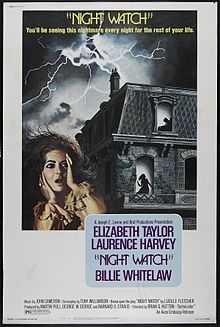
NIGHT WATCH
UK, 1973, 99 minutes, Colour.
Elizabeth Taylor, Laurence Harvey, Billie Whitelaw, Robert Lang, Tony Britton, Bill Dean.
Directed by Brian G. Hutton.
Night Watch is a murder thriller. It is a star vehicle for Elizabeth Taylor at age forty. She had already won two Oscars, in 1960 for Butterfield 8 (also with Laurence Harvey) and Who’s Afraid of Virginia Woolf in 1966. By this stage in her career she had spent thirty years in films beginning with Lassie Come Home, through National Velvet, through a number of dramas and period pieces like Ivanhoe and a number of dramas like Giant and Raintree County. She was an accomplished actress at this stage of her life. Laurence Harvey was to direct Welcome to Arrow Beach after this and star in it – unfortunately, his last film. Billie Whitelaw is always a strong presence in any film.
The story is based on a play by Lucille Fletcher, best known for her dramatic play, Sorry, Wrong Number, filmed with Barbara Stanwyck and Burt Lancaster in the late 40s. The screenplay for Night Watch bears some resemblances.
Elizabeth Taylor portrays a woman living in a Gothic atmosphere, atmosphere of ghosts, who is angry with her estranged husband and her best friend. She is investigating them with the hope of catching them out. The psychological drama builds to a head and a frantic finale.
The film was directed by Brian G. Hutton who had made the action adventures Where Eagles Dare and Kelly’s Heroes with Clint Eastwood. He had just made X, Y and Zee with Elizabeth Taylor.
Not one of Elizabeth Taylor’s best known films – but a satisfying film for those who like investigation thrillers with a touch of madness.
1. How entertaining? Techniques, atmosphere, excitement, shocks? Anything more than a conventional thriller?
2. The use of Elizabeth Taylor in a thriller and a shocker role? Laurence Harvey and Billie Whitelaw? The genre of identity, madness, violent deaths? Usual? Different?
3. The colour photography? London locations, the atmosphere of the house, the flat? Staircases? Special effects for terror?
4. How credible was the plot in terms of realism, for the purposes of the thriller? Psychological overtones? Atmosphere of violence and madness? Hyperbole rather than realism?
5. Ellen as a credible character? As portrayed by Elizabeth Taylor with her glamour and style? The background of the death of her first husband? her relationship with John? with Sarah? her hysteria, seeing people in windows? The goriness of what she saw? The suspicions of Appleby and his relationship with Ellen? The reaction of the police?
6. The seeming madness yet audiences identifying with Ellen? The reason for this? Realisation of the truth? the light that this threw on the characterization of Ellen? Sympathy for the other characters? Irony of her escaping and the confrontation with Appleby? Her future?
7. How credible was the character of John? As a foil for Ellen? The delineation of his character, coping? with Ellen’s hysteria, trying to do his best to help her? His relationship with Sarah? The character of Sarah, the contrast with Ellen? Her presence? The importance of Tony and his psychiatric advice? The build-up and the irony of
Ellen killing them both? Audience sympathy? The violent effect of their being the dead bodies in the window?
7. The character of Appleby and his sinister presence?
8. The atmosphere of the house? Atmosphere of violence? The garden?
9. How acceptable was the violence for this kind of murder thriller?
10. A ‘woman's picture’ with the emphasis on the suffering heroine? The atmosphere of the music, storms, eerie atmosphere?
11. How effective is this kind of entertainment?